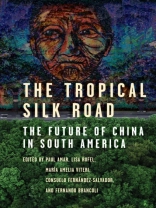This book captures an epochal juncture of two of the world’s most transformative processes: the People’s Republic of China’s rapidly expanding sphere of influence across the global south and the disintegration of the Amazonian, Cerrado, and Andean biomes. The intersection of these two processes took another step in April 2020, when Chinese President Xi Jinping launched a ‘New Health Silk Road’ agenda of aid and investment that would wind through South America, extending the Eurasian-African ‘Belt and Road Initiative’ to a series of mine, port, energy, infrastructure, and agrobusiness megaprojects in the Latin American tropics.
Through thirty short essays, this volume brings together an impressive array of contributors, from economists, anthropologists, and political scientists to Black, feminist, and Indigenous community organizers, Chinese stakeholders, environmental activists, and local journalists to offer a pathbreaking analysis of China’s presence in South America. As cracks in the progressive legacy of the Pink Tide and the failures of ecocidal right-wing populisms shape new political economies and geopolitical possibilities, this book provides a grassroots-based account of a post-US centered world order, and an accompanying map of the stakes for South America that highlights emerging voices and forms of resistance.
表中的内容
Acknowledgments
Introduction: China Stepping Out, the Amazon Biome, and South American Populism
—Paul Amar, Lisa Rofel, María Amelia Viteri, Consuelo Fernández-Salvador, and Fernando Brancoli
Part 1: Global Asia, New Imaginaries, and Media Visibilities
1.1. China’s State and Social Media Narratives about Brazil during the COVID-19 Pandemic
—Li Zhang
1.2. Cracks in the Coca Codo Sinclair Hydroelectric Project: Infrastructures and Disaster from a Masculine Vision of Development
—Pedro Gutiérrez Guevara, Sofía Carpio, and Mayra Flores
1.3. Brazil and China’s ‘Inevitable Marriage’? Post-Bolsonaro Futures and Beijing’s Shift from North America to South America
—Zhou Zhiwei
1.4. The China-Ecuador Relationship: From Correa’s Neodevelopmentalist ‘Reformism’ to Moreno’s ‘Postreformism’ during China’s Credit Crunch (2006–2021)
—Milton Reyes Herrera
1.5. China Studies in Brazil: Leste Vermelho and Innovations in South-South Academic Partnership
—Andrea Piazzaroli Longobardi
1.6. Chinese Financing and Direct Foreign Investment in Ecuador: An Interests and Benefits Perspective on Relations between States through the Lens of the Win-Win Principle
—David Mosquera Narváez
Part 2: Indigenous Epistemologies and Maroon Modernities
2.1. An Indigenous Theory of Risk: The Cosmopolitan Munduruku Analyze Chinese Megaprojects at Tapajós–Teles Pires
—Luísa Pontes Molina and Alessandra Korap Silva Munduruku
2.2. Challenges for the Shuar in the Face of Globalization and Extractivism: Reflections from the Shuar Federation of Zamora Chinchipe
—Jefferson Pullaguari
2.3. ‘Yes, We Do Know Why We Protest’: Indigenous Challenges to Extractivism in Ecuador, Looking Beyond the National Strike of October 2019
—Julia Correa, Israel Chumapi, Paúl Ghaitai Males, Jennifer Yajaira Masaquiza, Rina Pakari Marcillo, and David Menacho
Part 3: Grassroots Perspectives on the Fragmentation of BRICS
3.1. From Elusiveness to Ideological Extravaganza: Gender and Sexuality in Brazil-China Relations
—Cai Yiping and Sonia Correa
3.2. The Refraction of Chinese Capital in Amazonian Entrepôts and the Infrastructure of a Global Sacrifice Zone
—Gustavo Oliveira
3.3. ‘The Bank We Want’: Chinese and Brazilian Activism around and within the BRICS New Development Bank
—Laura Trajber Waisbich
3.4. Río Blanco: The Big Stumbling Block to the Advancement of China’s Mining Interests in Ecuador
—The Yasunidos Guapondélig Collective
3.5. Protectionism for Business, Precarization for Labor: China’s Investment-Protection Treaties and Community Struggles in the Latin American and Caribbean Region
—Ana Saggioro Garcia and Rodrigo Curty Pereira
Part 4: Logistics Regimes and Mining
4.1. A Mine, a Dam, and the Chinese-Ecuadorian Politics of Knowledge
—Karolien van Teijlingen and Juan Pablo Hidalgo Bastidas
4.2. Rafael Correa’s Administration of Promises and the Impact of Its Policies on the Human Rights of Indigenous Groups
—Emilia Bonilla
4.3. China Oil and Foodstuffs Corporation in the Tapajós River ‘Logistics Corridor’: A Case Study of Socioenvironmental Transformation in Brazil’s Northeast
—Alana Camoça and Bruno Hendler
4.4. Deforestation, Enclosures, and Militias: The Logistics ‘Revolution’ in the Port of Cajueiro, Maranhão
—Sabrina Felipe and Lucilene Raimunda Costa
Part 5: Hydroelectrics and Railroads
5.1. Hungry and Backward Waters: Events, Actors, and Challenges Surrounding the Coca Codo Sinclair Hydroelectric Project in Times of COVID-19
—Sigrid Vásconez D.
5.2. Electrification of Forest Biomes: Xingu-Rio Lines, Chinese Presence, and the Sociotechnological Impact of the Belo Monte Hydroelectric Dam
—Laís Forti Thomaz, Aline Regina Alves Martins, and Diego Trindade d’Ávila Magalhães
5.3. Vanity Projects, Waterfall Implosions, and the Local Impacts of Megaproject Partnerships
—Consuelo Fernández-Salvador and María Amelia Viteri
5.4. ‘Yes We Do Exist’: Ferrogrão Railway, Indigenous Voices in the Trail of Trade Corridors, and Building the Axis of ‘Brazilian Pragmatist Policy’ toward China
—Diana Aguiar
5.5. Green Marketing Extractivism in the Amazon: Imaginaries of the Ministry versus Realities of the Land
—Maria Elena Rodríguez
Part 6: Race, Class, and Urban Geographies
6.1. Steel Industry’s Legacies on the Outskirts of Rio de Janeiro and White Brazilian Capital-State Alliances: A Feminist Approach
—Ana Luisa Queiroz, Marina Praça, and Yasmin Bitencourt
6.2. Rio de Janeiro’s Unruly Carbon Periphery: Community Entrepreneurs, Chinese Investors, and the Reappropriation of the Ruins of the COMPERJ Oil Port-and-Pipeline Megaproject
—Fernando Brancoli and Wander Guerra
6.3. From Cheap Credit to Rapid Frustration: Real Estate in Rio de Janeiro
—Pedro Henrique Vasques
6.4. The China-Ecuador Economic Relationship’s Impact on Unemployment during the Administration of President Moreno
—David F. Delgado del Hierro
Part 7: Hybridity of Transnational Labor
7.1. Savage Factories of the Manaus Free Trade Zone: Chinese Investments in the Amazon and Social Impacts on Workers
—Cleiton Ferreira Maciel Brito
7.2. National Development Priorities and Transnational Workplace Inequalities: Challenges for China’s State-Sponsored Construction Projects in Ecuador
—Rui Jie Peng
7.3. Rio’s Phantom Dubai?: Porto do Açu, Chinese Investments, and the Geopolitical Specter of Brazilian Mineral Booms
—Marcos A. Pedlowski
关于作者
Paul Amar is Professor of Global Studies and Director of the Orfalea Center for Global and International Studies at the University of California, Santa Barbara.
Lisa Rofel is Professor Emerita of Anthropology at the University of California, Santa Cruz.
Maria Amelia Viteri is Professor of Anthropology at Universidad San Francisco de Quito (USFQ).
Consuelo Fernández-Salvador is Associate Professor of Anthropology, Universidad San Francisco de Quito (USFQ).
Fernando Brancoli is Adjunct Professor of International Security and Geopolitics at the Institute of International Relations and Defense at the Federal University of Rio de Janeiro (IRID-UFRJ).












